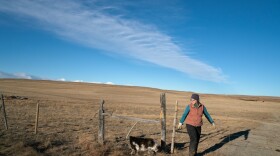The grizzly bear is an iconic species to many Native American tribes, and now a bill introduced in Congress would require tribes be included in their management. The legislation, called the was introduced by Raul Grijalva, the chair of the Natural Resources subcommittee.
Northern Arapaho-Standing Rock Lakota member Lynette Grey Bull testified in support of the bill, representing the Northern Arapaho Tribal Elder Society, and said grizzlies should only be killed for ceremonial purposes, like bald eagles.
"One of the quotes that I stated in the testimony from my uncle Crawford White, who is one of our ceremonial elders, is, 'The grizzly bear is our relative and is thought of as a human just like us. They know what our medicines are-our cedar, our sage. So what's next? Are you going to hunt us?'" said Grey Bull.
Grey Bull said tribes need more inclusion in grizzly decisions because wildlife management agencies have been hostile to tribal input in the past.
"A Cheyenne River tribal leader attended the meeting and he was expressing the cultural and heritage aspect of the grizzly bear. And unfortunately the director of Wyoming Game and Fish Brian Nesvik turned off his mic and kicked him off the stage," said Grey Bull.
But Wyoming Game and Fish Director Brian Nesvik said, it's not tribal participation they're concerned about but that grizzly management remains in state hands. Nesvik said if the law is passed, it will give federal agencies even more control over how grizzlies are managed, and that just won't work.
"I don't believe the federal government has the resources to be able to handle those conflicts now and resolve them nearly to the level that the state does," he said in reference to grizzly-human conflicts.
Nesvik added that Wyoming has an entire large carnivore crew to handle these potentially deadly encounters.
This story was produced by the Mountain West ���ڱ��� Bureau, a collaboration between Wyoming Public Media, Boise State Public Radio in Idaho, KUNR in Nevada, KUER in Salt Lake City, and KRCC and KUNC in Colorado.
Copyright 2020 Wyoming Public Radio. To see more, visit . 9(MDAxNDQ2NDAxMDEyNzU2NzM2ODA3ZGI1ZA001))







